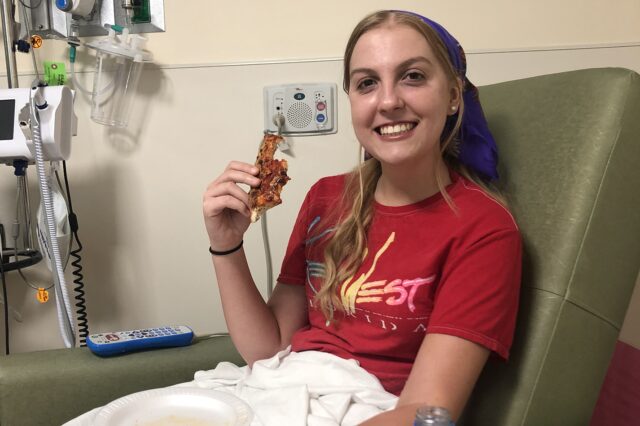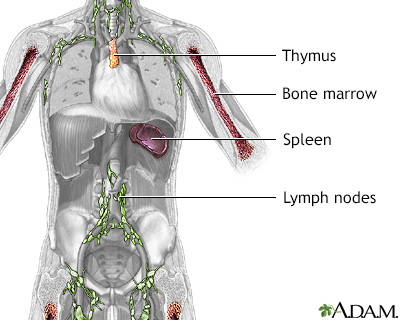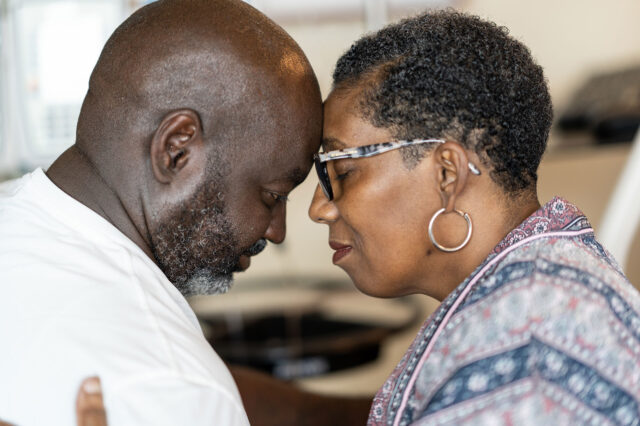Savannah Has No Time 'Fore' Cancer
As a young teenager, Savannah was an accomplished student-athlete who played on her high school’s girls golf team. She had been practicing with the team and…

Update your location to show providers, locations, and services closest to you.
Hodgkin lymphoma is a cancer of lymph tissue. Lymph tissue is found in the lymph nodes, spleen, liver, bone marrow, and other sites.

Lymphoma - Hodgkin; Hodgkin disease; Cancer - Hodgkin lymphoma
The cause of Hodgkin lymphoma is not known. Hodgkin lymphoma is most common among people 15 to 35 years old and 50 to 70 years old. Past infection with the Epstein-Barr virus (EBV) is thought to contribute to some cases. People with HIV infection are at increased risk compared to the general population.
The first sign of Hodgkin lymphoma is often a swollen lymph node that appears without a known cause. The disease can spread to nearby lymph nodes. Later it may spread to the spleen, liver, bone marrow, or other organs.
Symptoms may include any of the following:
Other symptoms that may occur with this disease:
Symptoms caused by Hodgkin lymphoma may occur with other conditions. Talk to your health care provider about the meaning of your specific symptoms.
The provider will perform a physical exam and check body areas with lymph nodes to feel if they are swollen.

The disease is often diagnosed after a biopsy of suspected tissue, usually a lymph node.

The following procedures will usually be done:
If tests show that you have Hodgkin lymphoma, more tests will be done to see how far the cancer has spread. This is called staging. Staging helps guide treatment and follow-up.
Treatment depends on the following:
You may receive chemotherapy, radiation therapy, or both. Your provider can tell you more about your specific treatment.
High-dose chemotherapy may be given when Hodgkin lymphoma returns after treatment or does not respond to the first treatment. This is followed by a stem cell transplant that uses your own stem cells.
You can ease the stress of illness by joining a cancer support group. Sharing with others who have common experiences can help you not feel alone.
Hodgkin lymphoma is one of the most curable cancers. Cure is even more likely if it is diagnosed and treated early. Unlike other cancers, Hodgkin lymphoma is also very curable in its late stages.
You will need to have regular exams for years after your treatment. This helps your provider check for signs of the cancer returning and for any long-term treatment effects.
Treatments for Hodgkin lymphoma can have complications. Long-term complications of chemotherapy or radiation therapy include:
Keep following up with a provider who knows about monitoring and preventing these complications.
Call your provider if:




Bartlett N, Triska G. Hodgkin lymphoma. In: Niederhuber JE, Armitage JO, Kastan MB, Doroshow JH, Tepper JE, eds. Abeloff's Clinical Oncology. 6th ed. Philadelphia, PA: Elsevier; 2020:chap 102.
National Cancer Institute website. Adult Hodgkin lymphoma treatment (PDQ) - health professional version. www.cancer.gov/types/lymphoma/hp/adult-hodgkin-treatment-pdq. Updated May 26, 2022 . Accessed June 8, 2022.
National Cancer Institute website. Childhood Hodgkin lymphoma treatment (PDQ) - health professional version. www.cancer.gov/types/lymphoma/hp/child-hodgkin-treatment-pdq. Updated April 8, 2022. Accessed June 8, 2022.
National Comprehensive Cancer Network website. NCCN clinical practice guidelines in oncology: Hodgkin lymphoma. Version 2.2022. www.nccn.org/professionals/physician_gls/pdf/hodgkins.pdf. Updated February 23, 2022. Accessed June 8, 2022.


Our community and patient programs provide great value to patients, families and loved ones. People can find support, educational materials, expert consultants and more. In most instances, these programs are offered free of charge.
Helps children and families cope with the stress and anxiety of hospitalization.
Gift donations for kids who have to stay in the hospital. Items are used in pediatric areas throughout the hospital.
Pain management treatment plans for cancer patients.
Peer companionship for adolescents and young adults living with serious illness.
As a young teenager, Savannah was an accomplished student-athlete who played on her high school’s girls golf team. She had been practicing with the team and…

Sandra Davis-Quinney has met bumps, curves and stops on her cancer journey. Even with the rough roads she’s traveled, Sandra tries to remain hopeful,…

You might think the only risk from hair dyes would be telltale...